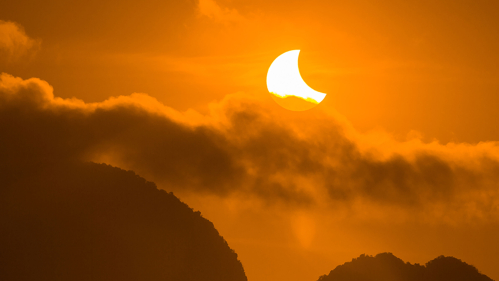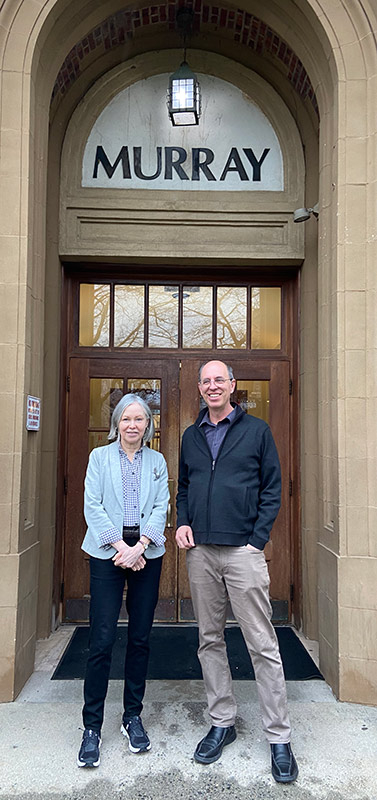In a Marathon Reading of Milton’s “Paradise Lost,” Art Will Mirror Nature

English scholars at Rutgers–New Brunswick to stage a literary eclipse party
At this solar eclipse party, expect to be handed eclipse glasses, folding chairs, books, a microphone – and apples.
On Monday, April 8, as the moon hurtles through its orbit on a path that will inevitably lead it between the Earth and sun, members of the Rutgers–New Brunswick Department of English will mark this year’s solar eclipse in their own way. Gathering at Voorhees Mall, they will take turns reciting lines from “Paradise Lost,” one of literature’s best-known poems showcasing an epic battle between goodness, represented as light, and evil, depicted as darkness.

Participants, who will start at 9:30 a.m. and finish at about 6 p.m., will read aloud every word of John Milton’s blank verse poem depicting the biblical fall from grace of Adam and Eve – all 12 books and more than 10,000 lines of verse. And for this “Paradise Eclipsed” event, they’re inviting everyone – students especially, but also faculty, staff and members of the public – to join them as readers to help them do it.
“It’s a perfect poem for somebody who’s 20 or 21 or 22,” said English Professor Ann Baynes Coiro, a Milton scholar in the Rutgers School of Arts and Sciences.
Coiro said her students are mesmerized by the 17th century poet’s masterpiece and will spend hours in class debating its ideas.
“It’s all about facing branching choices and knowing good by knowing evil – and learning to recognize that we can resent authority, especially when placed in a position of subservience, and that acquiring knowledge is the goal of education but that it complicates things,” she said.
Organizers will give free copies of the epic to the event’s volunteer readers, who will speak through a microphone while standing under a tent in front of Murray Hall. The hosts will offer chairs to onlookers. And, at the proper moment, they will dip their hands into a large basket and distribute apples. Over time, Coiro said, the apple has come to be generally understood to be the forbidden fruit referred to in the Bible.
Coiro, along with department colleague Brad Evans, selected Milton’s work as apt for the celestial event because eclipse imagery is laced throughout the work. Near the start of Book One, Milton compares Satan to an eclipsed sun:
“As when the Sun new ris’n
Looks through the Horizontal misty Air
Shorn of his Beams, or from behind the Moon
In dim Eclips disastrous twilight sheds…
Dark’n’d so, yet shon
Above them all the’ Arch Angel…”
“Paradise Lost” solidified Milton’s reputation as one of the greatest of English poets. The author employed light and darkness as symbols of the eternal struggle between good and evil. Because he was blind, Milton wrote the poem to be performative, said Coiro, meaning it was meant to be read aloud.
With Milton providing the words and nature providing the lighting, the scholars hope participants will enjoy the spectacle of art mirroring nature, as the shadow of the eclipse swells, darkens the landscape, then ebbs, returning the light.
New Jersey based viewers will see a partial, not a total solar eclipse, meaning that the moon will never fully block the sun. But astronomers say it is still worth watching, as the Earth will still darken as the sun becomes partially obscured, and the sun will look as though a bite has been taken out of it.
At the peak of the solar eclipse, with maximum darkness at about 3:24 p.m., the readers will have reached Book Nine, the section of the poem considered to be its dramatic climax. The poem’s passages focus on Adam and Eve’s final moments in the Garden of Eden. Eve is tempted by Satan and convinces Adam to disobey God’s instructions. They eat a piece of fruit they were forbidden to pluck from the Tree of the Knowledge of Good and Evil and are cast forever from Paradise.
“We planned the event to showcase the entanglement of nature and culture—how our ideas about the world have been shaped by the stories we share together,” said Evans, the director of undergraduate education for the Department of English.
At that moment, apples will be distributed to the crowd. “We’ll be eating apples in darkness,” Evans said.
Despite its age, the poem is surprisingly modern.
“It’s a love story,” Coiro said. “It’s a brilliant portrayal of what seems like a ‘real’ couple – Adam and Eve love each other, and they have fights.”
The organizers are spurred by the success of a similar “Paradise Lost” reading marathon, which the department staged about 10 years ago, drawing a crowd. The department also has hosted reading marathons at Rutgers Day, entertaining audiences with literary selections including J.D. Salinger’s Catcher in the Rye and J.R.R. Tolkien’s The Lord of the Rings trilogy.
The eclipse read-a-thon is co-sponsored by the Rutgers School of Arts and Sciences Honors Program, the Center for Cultural Analysis, the Rutgers Honors College and the Rutgers Center for the Philosophy of Religion. The event will occur, rain or shine.
“You can drop by to listen,” Evans said. “And anyone can get in the queue to read a verse paragraph.”


